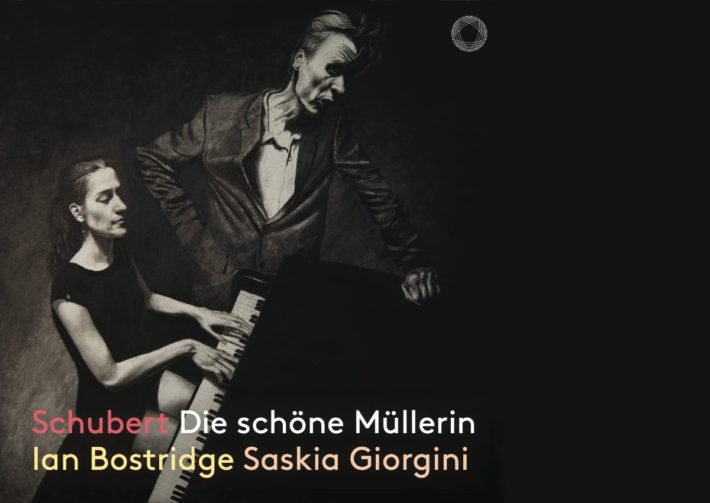Ian Bostridge has had an enduring relationship with Schubert’s song cycles, including three recordings alone of Winterreise and a 2005 version of Die schöne Müllerin with Mitsuko Uchida. Across the board is a nuanced approach, but his most recent performance adds a psychological element: the Maid upon which the entire cycle is based often appears almost as a figment of the Miller’s imagination, just out of his grasp.

In Das Wandern (track 1), Bostridge pairs his naturally light timbre with a robustness which captures the Miller’s hardy and adventurous spirit. The 2005 version, more buoyant, perhaps represents a younger, more naive Miller. His phrasing in Wohin (track 2) expresses the Miller’s optimistic inquisitiveness as he wonders where he will venture to. The pianist’s accompaniment, as the Brook, sheds light on an interesting dichotomy that will prevail through the rest of the cycle: where the Miller is an effusive character, the Brook is the opposite – the introverted and wise observer. Schubert adds more facets to the Miller’s personality in the middle of the set, such as in Morgengruss (track 8). Bostridge, too, reflects another dimension within the overlying calm and lyricism. His yearning for the Maid now mingles with trepidation when he entertains the idea that she may not feel the same.
Mit dem grünen Lautenbande (track 13) is the last song of hope after the protagonist has experienced several aspects of love: joy, heroism, determination, and vulnerability. In considering the cycle as a whole, Bostridge chooses to evoke the same positive energy of Das Wandern, almost as an emotional reminiscence of love’s promise. This heightens the unexpected arrival of tragedy in Der Jager (track 14). A strong collaborative effort, Bostridge’s pristine diction and the pianist’s crisp articulation bring urgency and suspense. Threatened by the arrival of the Hunter, the Miller reveals not just defiance but the emergence of a previously unseen darker side that will eventually overtake him.
The duo presents a well-conceived pairing in Die liebe Farbe/Die böse Farbe (tracks 17/18). The songs as a whole are about the color green. While it represented an everlasting love in its earlier appearances, that has now changed. In Liebe Farbe, it has become a symbol of despair. Bostridge’s performance unearths a carefully crafted presentation of the text and multiple shades of the Miller’s sadness: his gentle sostenuto quality throughout shows the protagonist’s resignation to an impending fate. At the same time, the tension in his high notes speaks to the pain of realizing a love lost. Böse Farbe unleashes a different side of suffering, the Miller’s anger and frustration at the color that mocked him. In revisiting his earlier version, we’re looking at a difference of intensity, partly due to the pianists’ interpretations: Uchida’s playing seems to boil just beneath the surface, but the pianist is more aggressive from the start. Both are equally convincing, but we can see how the different energies channel into Bostridge’s performance as well.
Der Müller und der Bach (track 19) at last presents the Brook as a personified presence engaging in an active dialogue with the Miller. It is interesting that Schubert would have waited until this late in the cycle to present such a conversation, but it seems to represents a finality – the only escape from an unrequited love is through death. Bostridge’s imaginative performance sees him assumes both roles. His first stanza gives the Miller’s sadness a very realistic quality, as though the pain has worn him down to the point he struggles to speak. His portrayal of the sympathetic Brook, on the other hand, is soothing and cathartic. The brightness in his voice now casts hope in a different light where the Miller can find peace not in love, but in departure. Des baches Wiegenlied (track 20) is a beautiful conclusion, a contemplative lullaby, that reflects the Brook’s role as the Miller’s eternal refuge and protector.
According to the booklet, this is a live recording from London’s Wigmore Hall, taken in April 2019. The sound engineering regretfully renders an otherwise wonderful performance a little flat at times. The piano seems to lack the presence and resonance it did in the 2005 recording. Despite this, the performance itself is a worthy listen and an interesting study into Bostridge’s increasingly profound approach to the cycle.
Recommended Comparisons
Bostridge | Fischer-Dieskau | Schreier | Wunderlich
Schubert – Die schöne Müllerin
Ian Bostridge – Tenor
Pentatone, CD PTC5186775




















